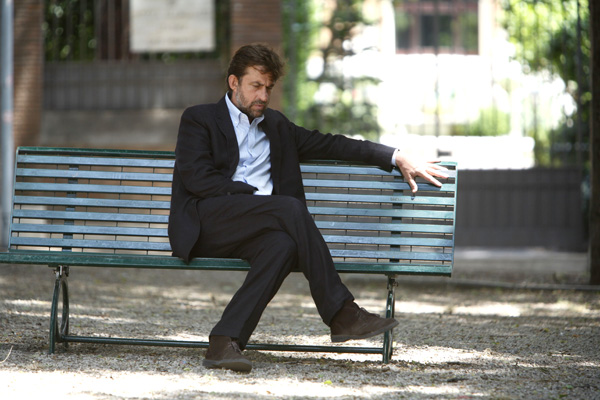|
Reviews of Recent Independent, Foreign, & Documentary Films in Theaters and DVD/Home Video

QUIET CHAOS At its most compelling, the characters of Quiet Chaos behave in ways to undercut what you might expect to happen in a seemingly uplifting family drama. Their unpredictability tempers the plot’s inherent sentimentality: Pietro, dressed in a designer suit, waits on a park bench all day long for his daughter, starting on her first day of school. During the summer, her mother died in a freak accident. It’s not that 10-year-old Claudia (Blu Yoshimi) is emotionally fragile—just the opposite. She’s calm, coming across as preternaturally mature or remote. Pietro’s slick, perma-tanned brother supposes that maybe Claudia takes her cues from her father. Occasionally reading a newspaper, or making mental lists—previous addresses or the names of airlines he has flown—Pietro observes while he waits. Daily, he sees the same boy with Down syndrome and his mother, a beautiful statuesque woman with her St. Bernard, and becomes a regular (and backseat cook) at the nearby café. But he doesn’t read emails or talk on his cell phone. His more-than-understanding company allows him, a high-powered media executive, to abandon his work for months—a picture of freewheeling corporate largess that slightly dates the film. It would be easy to shrug off the story of a middle-aged, closed-down man learning to connect, to get in touch with his feelings. (As noted in Sex and the City, women do this all the time. What do men expect, a medal?) But the understated cast (with the chaos largely implied) can’t be dismissed so easily. The who’s who of European stars include Italy’s answer to Michelle Pfeiffer, Isabella Ferrari, and Valeria Golino, who flits about as Pietro’s flighty, erratic sister-in-law. The one distraction is the out-of-left-field appearance of an instantly recognizable filmmaker as a CEO/deus ex machina. With French actor Charles Berling as one of Pietro’s business colleagues, it’s impossible not to think of Olivier Assayas’s Summer Hours, where Berling played the eldest son settling his mother’s artistically rich estate. The death of a family member, around which both these films center on, hardly matters; it’s the aftermath instead, with a sober and almost intellectual view of mourning. Both films endorse an option not often seen outside of revenge dramas—it’s okay not to cry. (But in no way is Quiet Chaos as thematically rich as the other film.) But
Quiet Chaos jerkily shifts tones, from oddly comic (a woman with a
nasty case of passive-aggressive Tourette’s) to blunt. And by blunt I
mean an indiscreet, in-your-face sex scene that turns the viewer from
observer to pervy voyeur. A not entirely believable subplot of corporate
intrigue stalls the film to a crawl, which, like the rest of the film,
neatly resolves when Pietro’s daughter makes a rather obvious request of
her father. The audience, too, will know exactly what prognosis to offer
Pietro. As for the film, which alternately pulls in and pushes back the
viewer, it has a case of schizophrenia.
Kent Turner
|

